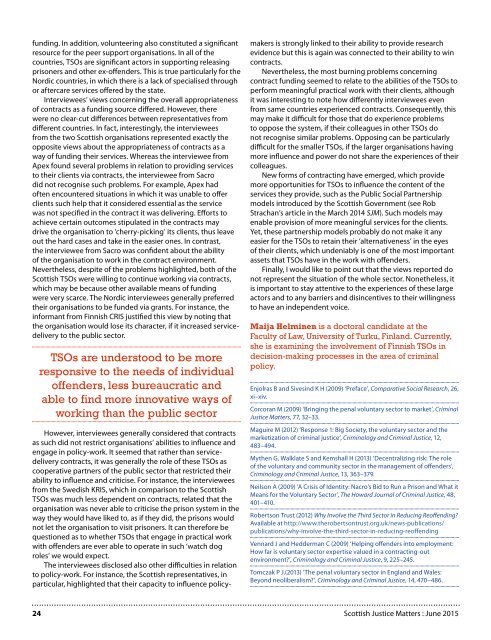Iy9yJ5
Iy9yJ5
Iy9yJ5
You also want an ePaper? Increase the reach of your titles
YUMPU automatically turns print PDFs into web optimized ePapers that Google loves.
funding. In addition, volunteering also constituted a significantresource for the peer support organisations. In all of thecountries, TSOs are significant actors in supporting releasingprisoners and other ex-offenders. This is true particularly for theNordic countries, in which there is a lack of specialised throughor aftercare services offered by the state.Interviewees’ views concerning the overall appropriatenessof contracts as a funding source differed. However, therewere no clear-cut differences between representatives fromdifferent countries. In fact, interestingly, the intervieweesfrom the two Scottish organisations represented exactly theopposite views about the appropriateness of contracts as away of funding their services. Whereas the interviewee fromApex found several problems in relation to providing servicesto their clients via contracts, the interviewee from Sacrodid not recognise such problems. For example, Apex hadoften encountered situations in which it was unable to offerclients such help that it considered essential as the servicewas not specified in the contract it was delivering. Efforts toachieve certain outcomes stipulated in the contracts maydrive the organisation to ‘cherry-picking’ its clients, thus leaveout the hard cases and take in the easier ones. In contrast,the interviewee from Sacro was confident about the abilityof the organisation to work in the contract environment.Nevertheless, despite of the problems highlighted, both of theScottish TSOs were willing to continue working via contracts,which may be because other available means of fundingwere very scarce. The Nordic interviewees generally preferredtheir organisations to be funded via grants. For instance, theinformant from Finnish CRIS justified this view by noting thatthe organisation would lose its character, if it increased servicedeliveryto the public sector.TSOs are understood to be moreresponsive to the needs of individualoffenders, less bureaucratic andable to find more innovative ways ofworking than the public sectorHowever, interviewees generally considered that contractsas such did not restrict organisations’ abilities to influence andengage in policy-work. It seemed that rather than servicedeliverycontracts, it was generally the role of these TSOs ascooperative partners of the public sector that restricted theirability to influence and criticise. For instance, the intervieweesfrom the Swedish KRIS, which in comparison to the ScottishTSOs was much less dependent on contracts, related that theorganisation was never able to criticise the prison system in theway they would have liked to, as if they did, the prisons wouldnot let the organisation to visit prisoners. It can therefore bequestioned as to whether TSOs that engage in practical workwith offenders are ever able to operate in such ‘watch dogroles’ we would expect.The interviewees disclosed also other difficulties in relationto policy-work. For instance, the Scottish representatives, inparticular, highlighted that their capacity to influence policymakersis strongly linked to their ability to provide researchevidence but this is again was connected to their ability to wincontracts.Nevertheless, the most burning problems concerningcontract funding seemed to relate to the abilities of the TSOs toperform meaningful practical work with their clients, althoughit was interesting to note how differently interviewees evenfrom same countries experienced contracts. Consequently, thismay make it difficult for those that do experience problemsto oppose the system, if their colleagues in other TSOs donot recognise similar problems. Opposing can be particularlydifficult for the smaller TSOs, if the larger organisations havingmore influence and power do not share the experiences of theircolleagues.New forms of contracting have emerged, which providemore opportunities for TSOs to influence the content of theservices they provide, such as the Public Social Partnershipmodels introduced by the Scottish Government (see RobStrachan’s article in the March 2014 SJM). Such models mayenable provision of more meaningful services for the clients.Yet, these partnership models probably do not make it anyeasier for the TSOs to retain their ‘alternativeness’ in the eyesof their clients, which undeniably is one of the most importantassets that TSOs have in the work with offenders.Finally, I would like to point out that the views reported donot represent the situation of the whole sector. Nonetheless, itis important to stay attentive to the experiences of these largeactors and to any barriers and disincentives to their willingnessto have an independent voice.Maija Helminen is a doctoral candidate at theFaculty of Law, University of Turku, Finland. Currently,she is examining the involvement of Finnish TSOs indecision-making processes in the area of criminalpolicy.Enjolras B and Sivesind K H (2009) ‘Preface’, Comparative Social Research, 26,xi–xiv.Corcoran M (2009) ‘Bringing the penal voluntary sector to market’, CriminalJustice Matters, 77, 32–33.Maguire M (2012) ‘Response 1: Big Society, the voluntary sector and themarketization of criminal justice’, Criminology and Criminal Justice, 12,483–494.Mythen G, Walklate S and Kemshall H (2013) ‘Decentralizing risk: The roleof the voluntary and community sector in the management of offenders’,Criminology and Criminal Justice, 13, 363–379.Neilson A (2009) ‘A Crisis of Identity: Nacro’s Bid to Run a Prison and What itMeans for the Voluntary Sector’, The Howard Journal of Criminal Justice, 48,401–410.Robertson Trust (2012) Why Involve the Third Sector in Reducing Reoffending?Available at http://www.therobertsontrust.org.uk/news-publications/publications/why-involve-the-third-sector-in-reducing-reoffendingVennard J and Hedderman C (2009) ‘Helping offenders into employment:How far is voluntary sector expertise valued in a contracting-outenvironment?’, Criminology and Criminal Justice, 9, 225–245.Tomczak P J.(2013) ‘The penal voluntary sector in England and Wales:Beyond neoliberalism?’, Criminology and Criminal Justice, 14, 470–486.24 Scottish Justice Matters : June 2015


